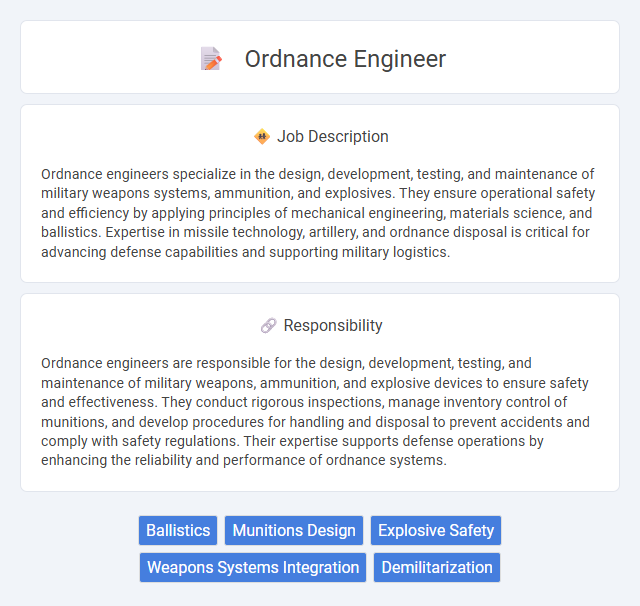
Ordnance engineers specialize in the design, development, testing, and maintenance of military weapons systems, ammunition, and explosives. They ensure operational safety and efficiency by applying principles of mechanical engineering, materials science, and ballistics. Expertise in missile technology, artillery, and ordnance disposal is critical for advancing defense capabilities and supporting military logistics.
Individuals with strong analytical skills and a keen interest in mechanical systems may have a higher probability of thriving as ordnance engineers. Those comfortable working in high-pressure environments and adhering to strict safety protocols might find this role suitable. Candidates lacking attention to detail or an aptitude for technical problem-solving could face challenges adapting to the demands of this profession.
Qualification
Ordnance engineers typically require a bachelor's degree in mechanical engineering, electrical engineering, or a related field, with specialized training in weapons systems and munitions design. Proficiency in computer-aided design (CAD) software and knowledge of defense industry standards are essential qualifications. Professional certifications, such as those from the Defense Acquisition University, enhance an ordnance engineer's credentials and career prospects.
Responsibility
Ordnance engineers are responsible for the design, development, testing, and maintenance of military weapons, ammunition, and explosive devices to ensure safety and effectiveness. They conduct rigorous inspections, manage inventory control of munitions, and develop procedures for handling and disposal to prevent accidents and comply with safety regulations. Their expertise supports defense operations by enhancing the reliability and performance of ordnance systems.
Benefit
Ordnance engineers likely enjoy significant benefits including competitive salaries and job stability due to the specialized nature of their work in defense and military sectors. They may also have access to advanced technical training and opportunities for career advancement in engineering and weapons development fields. Health insurance and retirement plans are often comprehensive, reflecting the government's investment in their expertise and safety.
Challenge
An ordnance engineer likely faces complex challenges involving the design, testing, and maintenance of explosive devices and weapon systems, requiring precise attention to safety protocols. The role probably demands problem-solving under high-pressure conditions where accuracy and reliability are critical. Engineering such specialized equipment may involve navigating strict regulatory standards and evolving technological advancements.
Career Advancement
Ordnance engineers specialize in the design, development, and maintenance of military weapons and ammunition, with career advancement opportunities often tied to gaining specialized technical certifications and leadership experience in project management. Progression can lead to senior roles such as Chief Ordnance Engineer or Research and Development Manager, where strategic oversight and innovation drive defense technology improvements. Mastery in systems integration, compliance regulations, and emerging technologies like robotics and AI enhances promotion prospects within defense contractors or government military organizations.
Key Terms
Ballistics
Ordnance engineers specializing in ballistics apply advanced principles of physics and materials science to design, test, and improve ammunition, explosives, and weaponry. Their expertise contributes to enhancing projectile accuracy, range, and impact effectiveness by analyzing internal, external, and terminal ballistics. Proficiency in simulation software and ballistic trajectory analysis ensures optimal performance and safety in defense and aerospace applications.
Munitions Design
Ordnance engineers specializing in munitions design develop advanced explosive devices and delivery systems, ensuring safety, reliability, and effectiveness for military applications. Their expertise includes ballistic calculations, materials science, and computer-aided design (CAD) to optimize warhead performance and detonation mechanisms. Collaboration with defense contractors and adherence to strict government regulations are critical for innovation and compliance in ordnance development.
Explosive Safety
Ordnance engineers specializing in explosive safety develop protocols for the safe handling, storage, and disposal of explosives, minimizing risk during military and industrial operations. They conduct rigorous risk assessments and implement safety measures aligned with federal regulations and military standards to prevent accidental detonations. Their expertise ensures compliance with Occupational Safety and Health Administration (OSHA) guidelines and Department of Defense (DoD) explosive handling directives.
Weapons Systems Integration
Ordnance engineers specializing in weapons systems integration design, develop, and test advanced weapons platforms to ensure seamless interoperability with vehicle and aircraft systems. They apply expertise in mechanical, electrical, and software engineering to optimize the performance and reliability of missile guidance, targeting, and launching mechanisms. Their role involves conducting rigorous analysis and simulations to meet stringent defense standards and enhance operational effectiveness in combat environments.
Demilitarization
Ordnance engineers specializing in demilitarization oversee the safe dismantling and disposal of obsolete or surplus munitions, explosives, and military equipment to prevent environmental hazards and ensure compliance with safety regulations. They utilize advanced techniques such as controlled detonation, chemical neutralization, and mechanical disassembly to render weapons systems inoperative and non-reusable. Expertise in hazardous materials handling, risk assessment, and environmental protection protocols is essential for effectively managing demolition sites and minimizing ecological impact during demilitarization processes.
 kuljobs.com
kuljobs.com